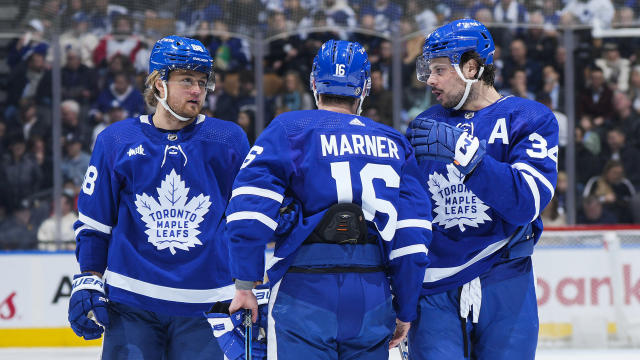
The Toronto Maple Leafs are in a state of turmoil. Or at least, one of turnover.
It’s been a few weeks since another promising Leafs’ season petered out in an utterly disappointing first-round Stanley Cup playoff series loss to the Boston Bruins — marking the seventh time in eight seasons Toronto has failed to advance past the first round in the postseason.
Granted, the Leafs rallied against the Bruins from a 3-1 series deficit to force Game 7. But Toronto’s overtime loss was a failure without justification, which can’t be ignored or swept under the rug. It has to induce some degree of change.
Toronto’s management group — president Brendan Shanahan, general manager Brad Treliving and Maple Leaf Sports and Entertainment CEO Keith Pelley — spoke after the Leafs’ defeat with pointed public comments about how “everything was on the table” to get Toronto past its perennial playoff woes.
The first domino to fall was — predictably — head coach Sheldon Keefe, fired from his post on May 9 and replaced by Craig Berube on May 23.
That swap is just the beginning of what could — and should — be a transformative offseason for the Leafs. There’s more the club needs to address to avoid finding itself in a similar position this time next year.
ESPN had discussions with sources inside and outside the organization as a summer of change has already started. Here are the different angles in play for the Leafs.
LET’S ADDRESS THE ELEPHANT(S) in the room.
Mitch Marner is about to enter the final year of his contract. Ditto for John Tavares. That’s two members of Toronto’s so-called “core four” facing foggy futures. There is a full no-movement clause attached for both players in the coming season, so the Leafs aren’t at liberty to orchestrate any trades.
However, a no-movement clause doesn’t preclude Treliving from asking around about the possibility of moving either player. Due diligence is part of a GM’s process, and Treliving can present Marner and Tavares with any scenarios that arise — and potentially pique their interest in allowing a trade.
Alternatively, Toronto could offer contract extensions to one or both skaters, removing some of that looming unpredictability.
Marner’s status in particular has been hotly debated. While the Leafs crashed and burned in the playoffs (again), Marner was practically nowhere to be found on the scoresheet. After putting up 26 goals and 85 points in 69 regular-season games, Toronto’s top winger added just one goal and three points in seven postseason tilts. It was a frustrating finish for Marner and the Leafs to not see his best game at the most critical time of the season — especially in a series where Toronto was getting shut down on a nightly basis by Boston’s Jeremy Swayman.
The noise surrounding Marner’s next chapter might not have gotten so loud if he had excelled in the postseason. His struggles might have also lessened appetites on both sides to begin extension talks when that window opens on July 1. In fact, it might behoove Marner to wait and see how the season begins — particularly with a new coach calling the shots — and then decide whether to re-up with the Leafs or explore free agency a year from now.
Marner is 27 years old. This is the prime of his career when his earning potential is at its highest. Toronto has already heavily invested in two other core pieces — Auston Matthews at $13.25 million per season and William Nylander at $11.5 million — and Marner seeking an equivocal payday (not to mention a raise from his current $10.9 million salary) may be too much for Toronto. And don’t expect Marner to take a discount just because he’s a Toronto-area native.
Tavares, on the other hand, could be more willing to accept less in order to stay. Toronto’s captain has continued to produce steadily — he scored 29 goals and 65 points in 80 games this season — and provides leadership in the Leafs’ dressing room. Tavares will be 34 when next season starts; any new contract will reflect that in both length and dollars.
Suffice to say, Toronto has questions to answer about two of its most important players. Having Marner and Tavares playing out these final seasons could be an unnecessary and potentially costly distraction if not properly managed. Toronto went through a similar situation with Nylander before he signed a seven-year extension in January. Marner’s situation will draw daily attention until there’s a resolution.
It won’t just be Marner fielding inquiries, either. His teammates will be peppered repeatedly about the negotiations, too. How Toronto balances those internal and external pressures will play a role in how the Leafs’ show up through the first half of their season (and maybe beyond).

Leave a Reply